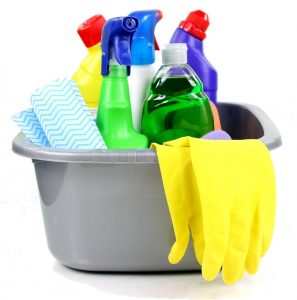Oh, it’s that time of year again! The birds are singing and everyone is ready for a fresh start to warm weather. ‘Tis the season for spring cleaning! Legacy staff shares some of the factors we consider when choosing environmentally friendly cleaning products!
- Packaging
The most common packaging for cleaning supplies is either rigid plastic, or flexible plastic. Highly variable from brand to brand is how much of the packaging is recycled plastic, and how recyclable it is after use. For example, many rigid containers can be made with up to 100% recycled content, and are widely recycled in local municipalities. Flexible plastic, like bagged soap refills, are often not made from recycled materials and cannot be recycled locally. However, the resource cost for producing and transporting rigid plastics is usually higher than flexible plastics, making the latter a more friendly option, especially if it is then sent to be recycled.
Our recommendation: Look for recyclable bottles with 100% recycled content for the biggest impact on packaging waste. Buy bulk: one large bottle uses less packaging than two small ones. If you can, use your own packaging at refill stations, like those found at People’s Co-op of Ann Arbor.
2. Formula
A lot of marketing goes into selling a product. For example “natural” or “naturally-derived” can mean that a certain chemical is included but instead of being sourced from petroleum, is sourced from corn. The environmental impacts of the chemical’s production would be different, but the potential health and environmental impacts would not.
Our recommendation: look for biodegradable formulas, so when they enter the atmosphere or waterways they will degrade. Avoid formulas warning about aquatic toxicity. Visit the website for the EPA’s Safer Choice labeling program, or the Environmental Working Group’s guide to healthy cleaning, to learn about environmental and health hazards associated with different ingredients in cleaners.
3. Unnecessary additives
Perfumes and dyes are unnecessary and can cause lung and skin irritation for people sensitive to them. A break-down of key marketing terms: “natural” perfumes and dyes can still be irritating due to allergies, “unscented” means the product lacks a detectable scent, while “fragrance-free” means that nothing beyond the necessary ingredients was added to give the product a scent.
Our recommendation: Join the fragrance-free movement by selecting products without added fragrance—even natural ones like orange and lemon oils.
4. Cost
Environmentally friendly cleaners can be expensive. Buying in bulk can help cut costs, as can learning about cleaning methods using household products. Some household chemicals are useful and generally not hazardous; some, however, can pose significant threats to personal and environmental health. Typically, homemade cleaners don’t perform as well as commercially available products, so you might be better off with a readily available product.
Our recommendation: shop around and buy on sale, targeting bulk packages. Refill stations usually have great prices as well!
We hope this guide helps you choose greener cleaning products this year! For more information on safety, visit the EPA Safer Choice website. Remember: always check your labels and recycle!


 RSS Feed
RSS Feed